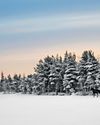
The water is cold inside Norway's northernmost fjords. When I slipped in headfirst, wearing a thick wetsuit, the four-degree-Celsius surface temperature made the water feel dense and biting on my exposed face. Diving down, I crossed a threshold into another world-dark, frigid, seemingly bottomless and home to giant carnivores that eat fish, seals and porpoises.
If you want to see wild orcas, they can be found in every ocean, from the Arctic to Antarctic. The coast of Canada's British Columbia, Argentina's Valdes Peninsula, and Australia's Bremer Bay are all popular orca-watching spots.
Despite their 'killer whale' nickname, orcas don't prey on humans. But they are the largest dolphins on the planet, with seven main ecotypes that vary in pigmentation pattern, diet and sonar dialect. Members of these groups don't usually mate with one another, though scientists are divided on whether to consider them different species.
Most countries set limits on how close you can get to orcas. That's not the case in Norway, which has no laws against swimming with dolphins and whales. (The country's whaling laws are also notoriously lax.)
This makes Norway an alluring destination for orca lovers, but it can also lead to danger for both humans and animals. At one point during my visit, I saw three young tourists from Spain block a pod of orcas with their sailboat, jump into the water and try to approach by paddleboard. Their tactics scared the orcas into hiding far below the surface. What's more, the Spanish tourists could have ended up stranded out there beyond the fjords, five kilometers from the nearest shoreline, left to the mercy of the fierce Arctic weather and currents.
この記事は Reader's Digest India の October 2022 版に掲載されています。
7 日間の Magzter GOLD 無料トライアルを開始して、何千もの厳選されたプレミアム ストーリー、9,000 以上の雑誌や新聞にアクセスしてください。
すでに購読者です ? サインイン
この記事は Reader's Digest India の October 2022 版に掲載されています。
7 日間の Magzter GOLD 無料トライアルを開始して、何千もの厳選されたプレミアム ストーリー、9,000 以上の雑誌や新聞にアクセスしてください。
すでに購読者です? サインイン

ME & MY SHELF
Siddharth Kapila is a lawyer turned writer whose writing has focussed on issues surrounding Hinduism. His debut book, Tripping Down the Ganga: A Son's Exploration of Faith (Speaking Tiger) traces his seven-year-long journey along India's holiest river and his explorations into the nature of faith among believers and skeptics alike.

EMBEDDED FROM NPR
For all its flaws and shortcomings, some of which have come under the spotlight in recent years, NPR makes some of the best hardcore journalistic podcasts ever.

ANURAG MINUS VERMA PODCAST
Interview podcasts live and die not just on the strengths of the interviewer but also the range of participating guests.

WE'RE NOT KIDDING WITH MEHDI & FRIENDS
Since his exit from MSNBC, star anchor and journalist Mehdi Hasan has gone on to found Zeteo, an all-new media startup focussing on both news and analysis.

Ananda: An Exploration of Cannabis in India by Karan Madhok (Aleph)
Karan Madhok's Ananda is a lively, three-dimensional exploration of India's past and present relationship with cannabis.

I'll Have it Here: Poems by Jeet Thayil, (Fourth Estate)
For over three decades now, Jeet Thayil has been one of India's pre-eminent Englishlanguage poets.

Orbital by Samantha Harvey (Penguin Random House India)
Samantha Harvey became the latest winner of the Booker Prize last month for Orbital, a short, sharp shock of a novel about a group of astronauts aboard the International Space Station for a long-term mission.

She Defied All the Odds
When doctors told the McCoombes that spina bifida would severely limit their daughter's life, they refused to listen. So did the little girl

DO YOU DARE?
Two Danish businesswomen want us to start eating insects. It's good for the environment, but can consumers get over the yuck factor?

Searching for Santa Claus
Santa lives at the North Pole, right? Don't say that to the people of Rovaniemi in northern Finland